



























































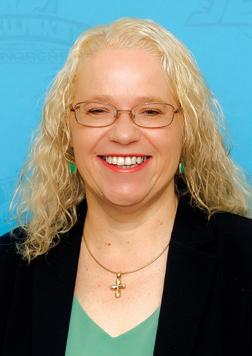
Dear parents and students,
Welcome to Emmanuel College. We are excited to have your family join us as your child begins their Year 7 journey in 2025. Starting secondary school is a significant and exciting time, and we’re here to ensure this transition is both smooth and rewarding. Enjoying a wide range of subjects to explore and numerous extra-curricular activities, your child will find many opportunities for growth and discovery. This handbook is designed to provide you with all the essential information you’ll need as you navigate this new chapter.
Emmanuel College has a rich history, deeply rooted in our Marianist heritage. This foundation guides us in nurturing a community where respect, integrity, responsibility, and excellence are the core values. Our students are the pride of the College, consistently reflecting these values in their daily interactions, their approach to learning, and their collaboration with peers and teachers.
Our dedicated teachers set high expectations to challenge and support students in reaching their full potential. We believe that these challenges are essential for developing resilience, critical thinking, and a passion for lifelong learning. As part of the Emmanuel College community, wearing the uniform with pride is important. It symbolizes unity and reflects our shared commitment to excellence and respect.
Communication between the College, home, and students is vital to fostering a strong, supportive environment. This handbook outlines how we’ll stay in touch with you throughout the year, ensuring an open and active dialogue. This partnership is key to ensuring that your child’s experience at Emmanuel College is positive and enriching. As we step into 2025, I am excited about the opportunities ahead. I wish every new Year 7 student great success as they begin their journey at Emmanuel College, and I look forward to working with you to support your child’s success.
Dr Janine Biggin Principal

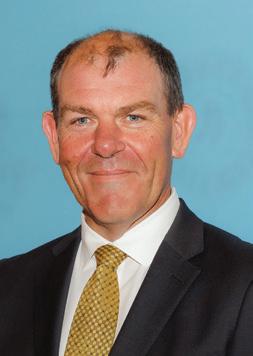
Dear students,
We hope that you are as excited about joining us as we are about you beginning at Emmanuel College next year. As a Year 7 Student in 2025 you can expect many opportunities to open up for you here at Emmanuel. New teachers, friends and subjects will provide an exciting new chapter in your schooling. Opportunities in sport, performing and creative arts, and Pastoral activities are a few of the many new and exciting things that will greet you here at the college when you arrive.
The first day of school in 2025 is Monday 3 February at 8.40am. Your first day will begin with a short assembly in the Hall and we will welcome you to the College where you will meet some of the teachers and staff that will form an important part of you life here at Emmanuel. Students from your homeroom will come and collect you and take you to your first activities. Throughout the day you will have the opportunity to become familiar with your student diary, meet some of your teachers and begin to organise your locker.
On your first day you need to wear your formal college summer uniform (not PE) and bring the following items with you:
• About half of your schoolbooks.
• Any forms that you may need to return.
• Lunch and snacks
Please ensure that you contact the College as soon as possible if you are unable to attend school on this day.
We hope that 2025 will be a wonderful and exciting year for you.
Chris O’Malley Executive Deputy Principal

The 3 blue partial ellipses represent Mary as we associate the colour blue with Mary. They gently sweep around the logo to show how Mary surrounds us with love and protection. The colour variation from light to dark represents her strength and nurturing love as our mother.
Reminds us of our call to lives of self-giving love. We are also reminded of Jesus’ sacrifice for us when he died on the cross.



This is our school motto. It comes from the Gospel of John. ‘I have come so that you may have life and have it to the full’. John 10:10. This encourages us to live a life that follows the example set by Jesus and where we strive to be our best where we use our gifts to reach our full potential.
The Gospel of Matthew cites the prophecy of Isaiah with regard to the birth of Jesus. The name Emmanuel means ‘God with us.’
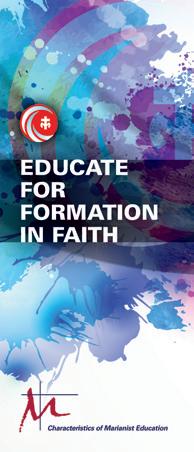
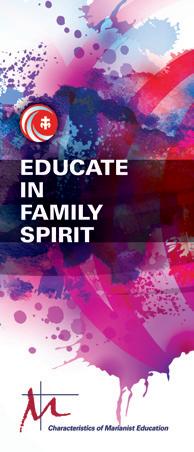
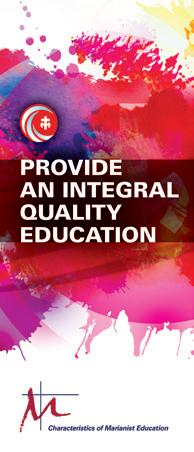
Represents Mary the mother of God. We are reminded that as our mother that we can turn to her, just as Jesus did when she was chosen for this very important role.
This entire symbol, the cross and the M is the Marianist symbol. It encompasses the cross to show the Marianists’ commitment as followers of Jesus and includes the M to represent Mary. Through modelling our lives on Mary we are brought closer to God.
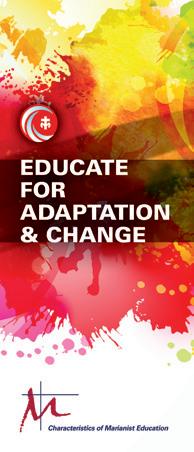
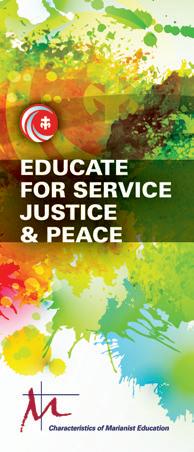










-





-




- Brother Don McCoy McCoy
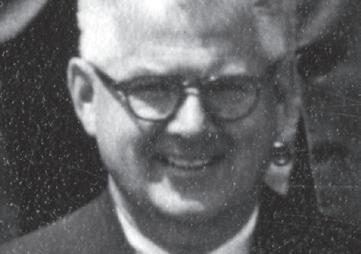





-


We recognise the importance of a well-planned and organised transition program to support Year 7 students as they make the important transition from primary to secondary school. This can be an exciting but nervous journey for many, students and parents alike.
Prior to enrolling with us, you may have taken the opportunity to visit Emmanuel College on one of our small group tours or at Open Day. Your son or daughter may have visited the College with their classmates in Grades 4 or 5, or you may have an older son or daughter already attending the College.
This handbook is designed to answer some of the questions that arise when families begin to familiarise themselves with Emmanuel College in preparation for next year.
All students and families should be familiar with, and be clear about, what is expected of our students regarding uniform and personal presentation. When students make a choice not to observe these standards, they are choosing to disregard College expectations and staff will be obliged to issue consequences to assist the student to be responsible for their choices.
Students have a responsibility to conduct themselves in an appropriate manner in all situations, particularly where they are wearing the College uniform. We expect that students will always be well-groomed and behave with courtesy, common sense, and consideration for others.
The Uniform Policy can be found on the College website. Students and Parents are required to be familiar with its expectations.
The College uniform is compulsory for all students from Year 7 to 12.
The Charter Buses will only stop at designated MET Bus stops unless designated below In the morning, the bus route will commence at Altona Station (Railway St S) at 7.40am.
• Turn Left into Pier St
• Turn Left into Civic Pde
• Turn Right into Grieve Pde
• Make a U-turn at Greeney St
• Turn Right back into Civic Pde
• Turn Left into Maidstone St
• Turn Right into Queen St
• Turn Left into Everingham Rd, stopping near Queen of Peace Primary School
• Turn Right into Victoria St
• Turn Left into Queen St
• Turn Left into Point Cook Rd
• Turn Right into Dunnings Rd
• Turn Right into Palmers Rd
• Turn Left onto Inverloch Dr
• Turn Left onto Foxwood Dr
• Turn Left on Dunnings Rd
Finish on Dunnings Rd Service Lane outside College
Afternoon Run Start in School Parking lot off Dunnings Road Service Lane
• Continue on Dunnings Rd
• Turn Left into Point cook Rd
• Turn Right into Central Ave
• Turn Right into Victoria St
• Turn Left into Everingham Rd
• Turn Right into Queen St
• Turn Left into Maidstone St
• Turn Right into Civic Pde
• Turn left into Grieve Pde
• Make a U-turn at Greeney St
• Turn Left back into Civic Pde
• Turn Right into Pier St
• Turn Right into Blyth St
• Turn Right into Railway St S
• Finish at Altona Station

The Charter Buses will only stop at designated MET Bus stops unless designated below
In the morning the bus will commence opposite Central Square on Merton St at 7.30am.
• Travel south along Merton St.
• Follow Merton St as it becomes Victoria St
• Continue north along Victoria St
• Turn Left into Nelson Ave
• Turn right into Merton St
• Pick up along Merton St towards Central Square
• Turn Left into Central Ave
• Turn Left into Point Cook Rd
• Turn Left into Sanctuary Lakes North Blvd and RUN EXPRESS to Vaucluse Blvd
• First Pick Up Point (Bust Stop id 50012) after Vaucluse Bvd
• Turn Left into Point Cook Rd
• Turn Right into Atlantis Drive/Fongeo Dr
• Continue along Fongeo Dr
• There will be a stop at the corner of Fongeo Dr and Vacation Way
• Fongeo Dr becomes Featherbrook Dr
• Turn Right into Boardwalk Blvd
• Turn Right into Dunnings Rd
Finish on Dunnings Rd Service Lane outside College
Afternoon Run Start in School Parking lot off Dunnings Road Service Lane
• Continue Dunnings Rd
• Make a U-turn at round about after Palmers Rd to come back on Dunnings Rd
• Turn Left into Boardwalk Blvd
• Turn Left into Featherbrook Dr
• Continue Featherbrook Dr becomes Fongeo Dr
• Turn Left into Point cook Rd
• Turn Right into Sanctuary lakes Blvd
• Turn Left into Sanctuary Lakes North Blvd and RUN EXPRESS to Vaucluse Blvd
• First Drop off Point (Bust Stop id 50012) after Vaucluse Blvd
• Turn right into Point Cook
• Turn Right into Central Ave (before freeway)
• Turn Right into Merton St
• Turn Left into Victoria St
• Turn Left into Nelson Ave
• Turn Right into Merton St
• Finish in front of Central Square on Merton St
The Charter Buses will only stop at designated MET Bus stops unless designated below In the morning, the bus will commence at the corner of May Avenue and Merton St at 7.40am.
• Travel west along May Ave/Spicer Blvd
• Turn Right into Henry Dr and becomes Macneil Dr
• Turn Left into Skehan Blvd
• Turn Left into Central Ave
• Continue towards Central Ave
• Turn Left into Central Ave
• Turn Left into Point Cook Rd
• Turn Right into Sneydes Rd
• Turn Right into Hacketts Rd
• Turn Right into Dunnings Rd
Finish on Dunnings Rd Service Lane outside College
Afternoon Run Start in School Parking lot off Dunnings Road Service Lane
• Continue on Dunnings Rd
• Make a U-turn at round about after Palmers Rd to come back on Dunnings Rd
• Turn Left into Hacketts Rd
• Turn Left into Sneydes Rd
• Turn Left into Point Cook Rd
• Turn Right into Central Ave
• Turn Right into Skehan Blvd
• Turn Right into Macneil Dr becomes Henry Dr
• Turn Left into Spicer Blvd
• Continue on May Ave
• Turn Left Merton St
• Finish in front of Central Square on Merton St
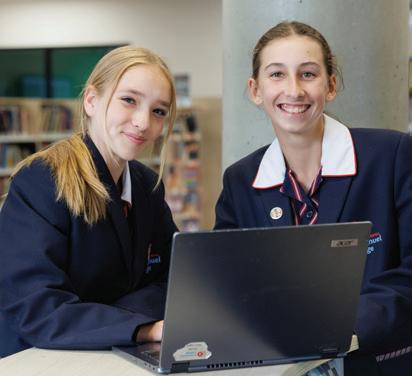

The Charter Buses will only stop at designated MET Bus stops unless designated below In the morning, the bus will commence in front of Altona Green Park at 7.40am.
• Travel west along Victoria St and then stop at the corner of Knightsbridge Ave and Merton St
• Turn left Knightsbridge Ave, stopping at the corner of Knightsbridge Ave and Waratah Dr.
• Turn Left into Merton St
• Travel along Merton St towards Central Square
• Turn Right into Queen St
• Turn Left into Victoria St
• Turn Left into Hall Ave
• Turn Right into Merton St
• Turn Left into Railway Ave becomes Triholm Ave
• Turn Left into Point Cook Rd
• Turn Right into Dunnings Rd
• Turn Right into Palmers Rd
• Turn Left into Inverloch Dr
• Turn Left into Foxwood Dr Finish on Dunnings Rd Service Lane outside College
Afternoon Run Start in School Parking lot off Dunnings Road Service Lane
• Turn Left into Point Cook Rd
• Turn Right into Triholm Ave becomes Railway Ave
• Turn Right into Merton St
• Turn Left into Hall Ave
• Turn Right into Victoria St
• Continue travel south down Victoria St
• Turn Right into Merton St
• Turn Left into Knightsbridge Ave
• Turn Left into Merton St
• Finish in front of Central Square on Merton St
The Charter Buses will only stop at designated MET Bus stops unless designated below In the morning, the bus will commence in front of Lumen Christi Primary School at 7:40am.
• Travel southwards along Point Cook Rd
• Turn left into Sanctuary Lakes Blvd
• Travel left into Sanctuary Lakes North Blvd and around the Blvd
• Pick up students until Vaucluse Blvd (Bus Stop Id 50011)
• Run express from Vaucluse Blvd (Bus Stop Id 50011) following loop until Point Cook Rd
• Upon exiting Sanctuary Lakes South Blvd, turn right into Point Cook Rd
• Turn left into Dunnings Rd
• Turn RIGHT into Palmers Rd
• Turn LEFT into Inverloch Dr (First Left)
• Turn LEFT into Foxwood Dr
• Turn Left into Dunnings Rd Finish on Dunnings Rd Service Lane outside College
3:20pm Start in School Parking lot off Dunnings Road service road.
• Continue Dunnings Rd
• Turn right Point Cook Rd
• Turn left into Sanctuary Lakes Blvd Bus
• Travel along Sanctuary Lakes Blvd
• Drop off students till Vaucluse Blvd (Bus Stop Id 50011)
• Finish at Vaucluse Blvd/Sanctuary Lakes North Blvd.
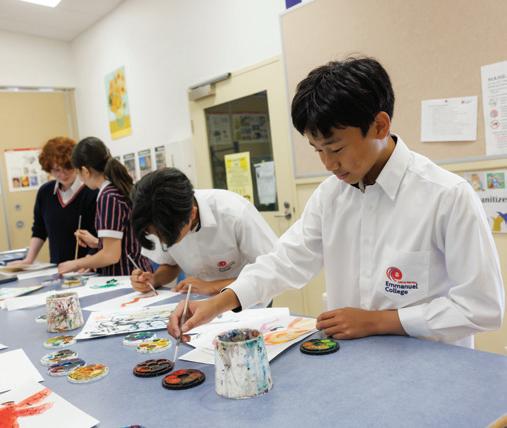

The Charter Buses will only stop at designated MET Bus stops unless designated below In the morning the bus will commence at the stop near the corner of Clearwood Dr and Leakes Rd (Bus Stop id 27994) at 7.20am.
• Turn Left into Morris Rd
• The second stop will be on the corner of Morris Rd and David John Drive Tarneit.
• Then travel eastwards along Sayers Rd
• Turn Right into Palmers Rd
• Stop near the intersection of Palmers Rd and Delaney Blvd
• Turn Left into Dunnings Rd
• Turn Right into Point Cook Rd
• Turn Left into Saltwater Prom
• Not leave the first stop in Saltwater Prom until at least 7.45am
• Follow Saltwater Prom all of the way down and return back from Jansar St Roundabout up Saltwater Prom (497)
• Turn Right into Point Cook Rd
• Turn Left into Dunnings Rd
• Turn Right into Palmers Rd
• Turn Left into Inverloch Dr
• Turn Left into Foxwood Dr
• Turn Right into Dunnings Rd (Service Lane) Finish on Dunnings Rd Service Lane outside College
Afternoon Run Start in School Parking lot off Dunnings Road Service Lane
• Continue from service lane on Dunnings Rd
• Turn right into Point Cook Rd
• Turn left into Saltwater Prom
• Follow Saltwater Prom all the way down and return from Jansar St Roundabout up Saltwater Prom (497)
• Turn right into Point Cook Rd
• Turn Left into Dunnings Rd
• Turn Right into Palmers Rd
• Turn Left into Sayers Rd
• Turn Right into Morris Rd
• Turn Right into Leakes Rd
• Finish corner of Clearwood Dr
Please note that bus routes are correct at time of printing. They are always reviewed and amended according to student population density and families will be notified of any adjustments, when and if, changes occur.
Students must have the yearly ticket to use the charter bus. The cost for using the charter bus service will be comparable to the price of a MYKI yearly student concession ticket.
Students will be issued with a distinctive ID card that will provide access to the bus in the morning and afternoon on all school days. Please note that this is not a MYKI and cannot be used on public transport.
Altona / Altona Meadows
• Students may catch the 411 or 412 bus and link with the 498 bus at Laverton station.
• Catch train to Westona Station and link with Charter Bus in Maidstone Street.
Point Cook and Sanctuary Lakes
• Route 497 Laverton station.
Other Areas:
• Train to Williams Landing Station and link with the 416, 494, 495, 497 and 498 bus.
• Catch train to Westona Station and link with Charter Bus in Maidstone Street.
• Catch train to Laverton Station and link with the 498 bus.
Timetables for the public routes may be downloaded at https://cdcvictoria.com.au/ .

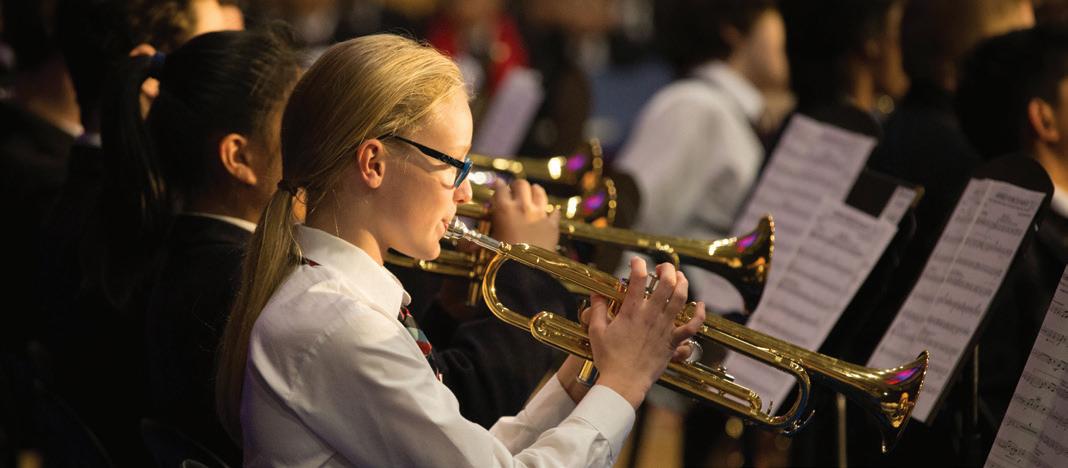
Our orientation program begins on Tuesday 3 December, 2024. This day is designed for students to become more familiar with the environment in which they will spend their days. Students will participate in fun activities to get to know other students and the teachers.
Term starts on Monday 3 February, 2025. Students will participate in a special program for the first two day of school to prepare them for their normal classes. Students receive their 1:1 laptops during this program. Students consider transition issues as they arise over the year. It is also a time when as a year level the students come together to discuss issues of relevance to them, for example; cybersafety.
Students will attend Year 7 camp at Portsea or Mt Evelyn in Victoria, Notre Dame students will attend the camp on a date to be advised. No additional charges will be incurred as a result of the Year 7 camp.
Excursion Forms will be completed via Operoo and families will be expected to have completed this permission request no later than Friday 7 February, 2025.
The Resilience Project was set up by Hugh van Cuylenburg based on his experiences of living in an under privileged community who experienced superior levels of happiness and well-being. Key principles of the project are Graditude, Empathy and Mindfulness. Reslience Education continues to be a significant aspect taught through the Pastoral Program.
Shaped by 140 years of experience, decades of research and thousands of dedicated teachers, the Berry Street Educational Model helps educators gain new perspectives, strategies and skills to build safer, healthier and more engaging classrooms for all students.
Student wellbeing being is very important at Emmanuel college and to foster this, students engage with Wellio. Delivered via a digital platform to proactively improve a student’s wellbeing through engaging lessons and activities. Covering topics ranging from; social media, transition, building connections and Childsafe, these promote and keep student wellbeing as the central focus at Emmanuel. Led by the Pastoral teacher, these topics are worked through as part of a weekly pastoral period. Students are engaged in Wellio lessons that help support and develop them in their personal growth and wellbeing.

MONDAY
8.45am 8.50am Move to Period 1
8.50am 9.38am Period 1
9.38 am 9.41am Travel Time
9.41am 10.29am Period 2 - Pastoral
10.29am 10.50am Recess
10.50am 10.54am Lockers
10.55am 11.43am Period 3
11.43am 11.46am Travel Time
11.46am 12.34pm Period 4
12.34pm 1.15pm Lunch
12.43pm Oval Available for games 12.53pm Yard Duty Change Over 1.15pm End of Lunch 1.15pm 1.21pm Lockers
1.21pm 2.09pm Period 5
2.09pm 2.12pm Travel Time
2.12pm 3.00pm Period 6
TUESDAY - FRIDAY
8.45am 8.50am Move to Period 1
8.50am 9.08am Homeroom
9.08 am 9.11am Travel Time
9.11am 9.59am Period 1
9.59am 10.02am Travel Time 10.02am 10.50am Period 2
10.50am 11.09am Recess 11.09am 11.13am Lockers
11.13am 12.01pm Period 3
12.01pm 12.04pm Travel Time
12.04pm 12.52pm Period 4
12.52pm 1.32pm Lunch
1.02pm Oval Available for games 1.12pm Yard Duty Change Over 1.32pm End of Lunch
1.32pm 1.36pm Lockers
1.36pm 2.24pm Period 5 2.24pm 2.27pm Travel Time 2.27pm 3.15pm Period 6
Please note: Structure of days may be subject to change. This is an example only.
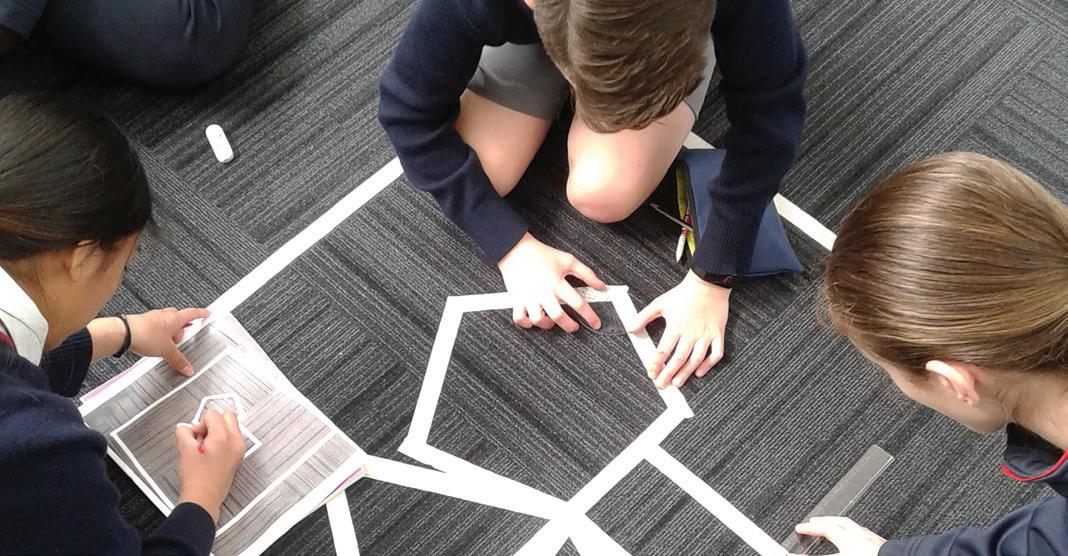

The College has vertical homerooms and operates a house structure to:
• Increase students’ social repertoire by broadening the range of social contact they are exposed to.
• Foster connectedness to the whole school community.
• Provide proactive measures to improve mental health, resilience, safety and wellbeing.
• Increase students’ sense of responsibility for others in the school community.
• A multi-age homeroom provides an alternative peer group enabling:
• Opportunities to mix and be exposed to other intellectual, physical, social and emotional levels.
• Help to minimise the impact of midadolescence, where students developmentally are more likely to have issues with regard to self-esteem, anti-social and high-risk behaviours.
• Provide extra support and connectedness.
• Expose students to caring and positive relationships rather than their usual tendency to congregate with some peers who may share similar issues.
House operation is the responsibility of House teams and classroom teachers, convened and facilitated by the House Leaders, with the support of Pastoral Leaders. This pastoral leadership team is convened and facilitated by the Deputy Principal, Campus Leader. All levels of college operation, including the work of house teams, subject departments, and pastoral/learning leadership teams converge in the core business of the college: working with young people in teaching and learning which is always underpinned by the wellbeing and safety of young people. These two areas are inextricably linked.
House teams are supported by other wellbeing teams including:
• Student Support Team - School Counsellors / Psychologist / Youth worker
• Careers Leaders
• Learning Support Team
• Student Services
• External Partnerships and referrals
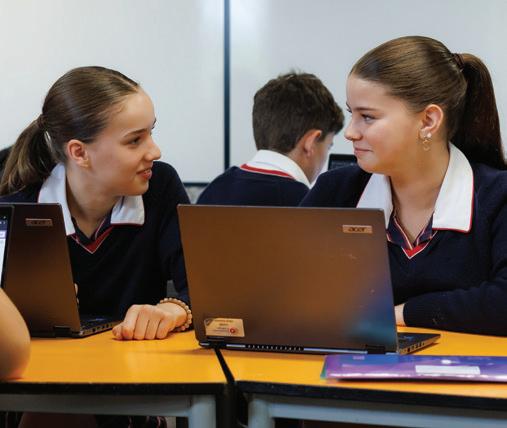
Any student who arrives late for school must report to the Attendance Officer to sign in. Students must sign in electronically on SEQTA.
Consistent lateness will result in a systems detention and further discussion with parents/guardians.
Will my child get the opportunity to compete against other schools?
Notre Dame students will have the opportunity to participate in carnival events and the Premier League in the Sports Association of Catholic Co-educational Secondary Schools (SACCSS).
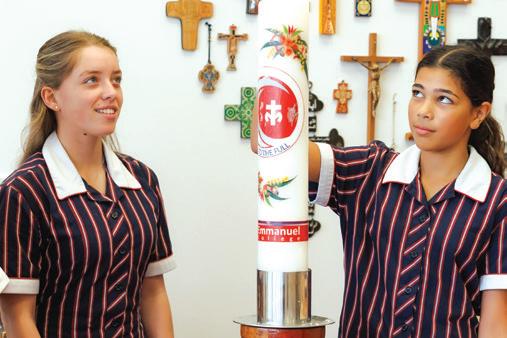

Supporting the growth and learning of the young people whom we serve occurs in partnership with parents – the first educators of their children. We strive, as do parents, to develop well-rounded young people of character and confidence, who believe in themselves and grow in the mature capacity for empathy and consideration of others.
As a College we will engage with you in a range of ways to ensure that you are provided with information you need to support the growth and learning of your son/daughter. And through working closely with you, we will learn more about the students we serve. This section outlines our College procedures and policies that directly impact you.
Our front office is open from 8.00am till 4.15pm during the school year.
Over the summer break the school will be closed from mid-December 2024 and will reopen in late January 2025. Confirmed dates will be communicated with you before the end of 2024.
The College will be posting information to you about your school fees for next year in December 2024. There are a number of ways in which families can pay their school fees.
We encourage families to move towards a direct debit payment system, where the College arranges with your bank for payments to be made from your account or credit card via regular intervals.
Please keep an eye out for links to our easy to follow tutorial guides for using SEQTA Engage that will be sent to you in January 2025.
Parents / guardians must contact the Attendance Office as early as possible to notify if a student will be absent from school.
1. Please email your campus attendance office before 9.00am.
NDCattendance@ecmelb.catholic.edu.au
2. Alternatively, please call the office on 03 8325 5100 and follow the prompts.
Please ensure your child brings a written confirmation of their absence with your signature when they return.
If you have not contacted the College by 9.00am, a text message will be sent to you to indicate your child’s absence. You are expected to respond to this text message as soon as possible.
It is not appropriate for families to take holidays during school term where your child will be absent from school for an extended period of time. We do appreciate that unforeseen events may take place throughout the school year in which instance we ask you to contact your House Leader as soon as possible to discuss the arrangements that will affect your child’s studies.School work will not be provided by teachers for students taking holidays during the school term.
The College provides a sick bay for students who become ill during the day. A student who is ill should not come to school. Parents may be contacted and asked to take ill students home. Parents should be aware that medication will not be given without prior written consent and supply of medication.
Detailed information should be lodged with the office in cases where students are required to take regular medication. Parents are strongly advised to join Ambulance Victoria. In case of an emergency the College will call an ambulance.

Many students at the College need medication to control a range of illnesses and other medical conditions. Each student who has a medical condition or illness will have an individual written management plan which is included in their file and recorded in a first aid file held by the first aid officer. This management plan should include details of:
• The usual treatment needed by the student at school or on school activities.
• The medical treatment and action needed if the student’s condition deteriorates.
• The name, address and telephone numbers for an emergency contact and the student’s doctor.
• Students with anaphylaxis / asthma / diabetes will have to provide a Management Plan that is signed by your family doctor.
This information will be collected via Operoo when parents set up a profile in a response to an invitation from the College. Parents are asked to maintain their Operoo profile and update any changes to the plan as they occur.
Any medication to be administered at the College must be provided in original containers, with written instructions.
At Emmanuel College we hold the care, safety and wellbeing of children and young people as a central and fundamental responsibility of our school. Our commitment is drawn from and inherent in the teaching and mission of Jesus Christ, with love, justice and the sanctity of each human person at the heart of the gospel (CECV Commitment Statement to Child Safety).
The person of each individual human being, in his or her material and spiritual needs, is at the heart of Christ’s teaching: that is why the promotion of the human person is the goal of the Catholic school (Congregation for Catholic Education 1997, n. 9). Our values are underpinned by our commitment to bear witness to the following shared values as modelled by Jesus Christ and exemplified in the life of William Chaminade: Justice, Respect, Responsibility, Honouring Diversity, Honesty, Compassion, Commitment and Endeavour.
The essence of the College is learning and teaching, with faith education, and the safety of our young people, as a primary focus.
There are a range of avenues that parents / guardians can access when it comes to talking to someone at the College about your child. In general, it is always a good idea to contact our Front Office staff who are very helpful and can support you to ensure that you speak to the most appropriate person at that point in time.
Initially, any discussion about your child’s wellbeing should go through their Homeroom Teacher first and then their House Leader. Dependent on the nature of the concern, the House Leader may refer the issue to our Pastoral Leader or Deputy Principal Wellbeing.The Deputy Principal Wellbeing has overall responsibility for Pastoral Care in the school.
For more information about our Pastoral Program, please see Section 3 of this booklet.


Essential Information for Parents and Guardians (Cont.)
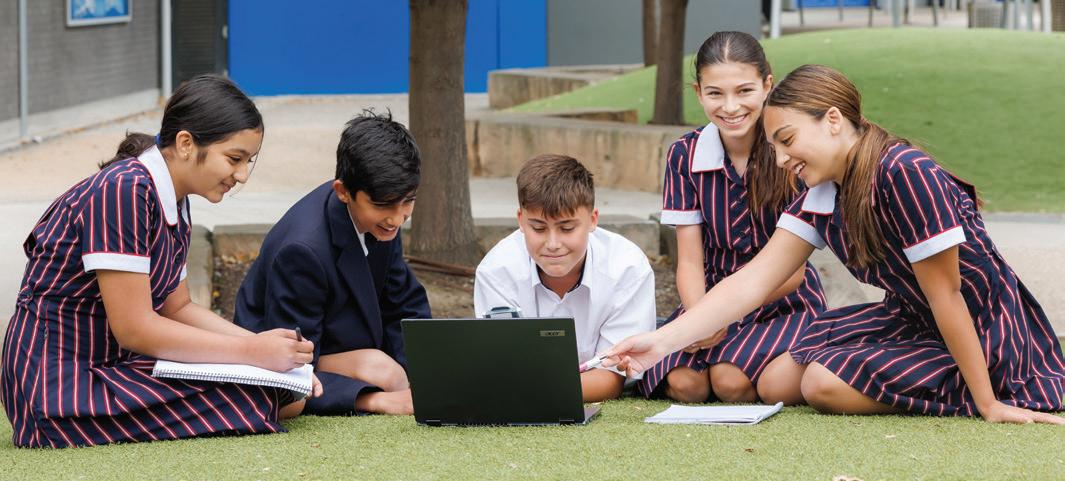
Your first method to reach your child through the school day should be via our College front office. In an emergency situation, it is vital that you contact our front office.
Please refrain from contacting your child on their mobile phone. Students must turn their phones off during class time so if you need to leave an important message for your child, calling our front office is always best. Please see section below on our policy about student use of mobile phones.
Emmanuel College acknowledges the growing use of mobile phones by students and the importance it now serves as a tool of communication between parents and students. If parents want their child to have a phone at school, so contact can be made in an emergency, after school, or messages left, the Mobile Phone Policy Conditions must be observed. Further information about the College Mobile Phone Policy please visit https://www.ecmelb.catholic.edu.au/our-coll/ policies
Lockers are provided for all students and non essential personal items such as phones. Any electronic games are not permitted at the College. Bags should be stored in lockers during the school day. All property should be clearly labelled. Missing items should be reported immediately to Student Services and the Homeroom Teacher informed.
Whilst the College provides amenities for the care of student personal items, the College is not liable for any loss or damage to student belongings and we reserve the right to inspect lockers as required.

Emmanuel College has a Learning Management System, called SEQTA, which can be accessed by staff, students and parents. Parents can access this by logging onto our Engage Portal. You can find this link on our College’s website.
Early in Term 1 we will contact you to provide you with a username and password so you can access ENGAGE. It is important that you keep these details in your records as you will be using this information to access ENGAGE throughout the duration that your child is with us.
Your child will be given access to SEQTA during their orientation program. We will provide supporting information to help you navigate your way through ENGAGE.
Student, Parent and Teacher Interviews take place twice a year. You will be notified when bookings are open. All bookings are made online via ENGAGE on Parent Teacher Interviews and you can book a time with any of your child’s teachers.
Should you have any difficulty with booking appointments, you can call the College and our staff will talk you through the process on the phone.
You will receive feedback regarding your child’s progress at regular intervals throughout the year. This feedback will be directly related to assessment tasks for each subject. In addition you will receive a summary report at the end of each semester that contains grades for each of the assessment tasks and progress towards the achievement of the Victorian Curriculum.
We do not produce hard copy reports. All reports will be available online via ENGAGE. We will ensure that all families have information to support them to access and interpret our school reports.
Operoo is a communications system that is critical in granting permissions and detailing any health issues your child may have. Please refer to Section 6 of this booklet for detailed information on the operation of Operoo.
The College produces a fortnightly newsletter which is available on our website. Parents are notified by email when the most recent newsletter is available. Historic copies of our newsletters are available online by logging onto ENGAGE.
The College also produces a Quarterly newsletter called EC News. This publication features images from across our College community, celebrating our achievements throughout the term.
You will also receive a range of other communications throughout the school year from the Principal, Deputy Principals, and Director of Development and Marketing or other staff.
Every term, the College hosts parent forums and information sessions as well as a range of other school functions. Parents will be invited to attend these events as they occur. These are an ideal way to meet other families, get involved in the College community and learn more about how we are supporting our students to pursue their personal best.


Pastoral Care is our ‘hidden curriculum’ - it is what we impart by our attitudes and behaviours, about the values and ethics we maintain. Pastoral Care is the visible expression of faith, demonstrated by our concern and caring for each other. It is the sharing of our sense of community between staff, students, parents and teachers. As such, pastoral care of the school is not just limited to students. It involves the individual’s awareness that they belong to a caring community where that person is accepted and valued.
Pastoral Care is expressed in practice in being available to listen to and help students (and colleagues). Simply ‘being there’ as a caring presence is crucial as pastoral care involves helping students with academic or non-academic problems, whenever and wherever they may occur. It is reflected in a private word of praise, encouragement, or help during class time. It is expressed through staff and student involvement in activities such as debating, sporting teams, camps, and so on, where both are freed from the constraints of formal educational curricula.
Pastoral Care is also the recognition of the individual, and nurturing of their development towards ‘selfhood’, without intruding upon personal integrity. It is the guidance of students towards self-discipline and the sense of personal responsibility. Finally, Pastoral Care is the recognition of the frailty and fallibility of others and the opportunity for loving forgiveness for human shortcomings.
• Every student and every staff member is a part of the Pastoral Care Program.
• Each teacher is assigned to a Pastoral Team and will have meetings on a regular basis with other teachers from the same House. The House Leader will chair this meeting.
• The Pastoral Care Program will revolve around the Homeroom System, with the Homeroom Teacher and House Leaders being the guiding force in the implementation of the Program. The Homeroom Teacher is the central contact between their students and other staff members, and between students and parents.
• Each House Leader oversees a number of Homerooms across the College. This further enhances the pastoral approach to students, staff and parents.
During their time at Emmanuel College, students will belong to a House. The College houses are named after people who brought Marianist education to our region and who had a major impact on our College:
• Winters – Fr. Dan Winters, past Principal
• McCluskey – Br. John McCluskey, first Principal of the College
• McCoy – Br. Don Mc Coy, last Marianist brother who was Principal of the College
• Cassidy - Fr. John Cassidy, Parish Priest of Williamstown, who lobbied hard for the establishment of St Paul’s College.
• Chaminade – William Joseph Chaminade, founder of the Society of Mary (Marianists)
Aims and values of the College:
• We seek to provide an environment of mutual encouragement and support which fosters self-discipline and self-esteem.
• We value respect for the dignity God gives each person.
• We expect College members to treat each other with dignity, compassion and respect for social and cultural differences.

Because we hold these values, students and staff enjoy RIGHTS at Emmanuel College. Students have the following rights:
• to be treated justly and to be valued as individuals
• to have a curriculum that is challenging, meaningful and appropriate to individual and collective needs
• to have a safe, clean and attractive College environment
• to have all property respected
• to be informed of all relevant College policies and procedures
• to have all work expectations made clear and to be informed regularly about their progress
• to participate in appropriate decision-making.
No one can enjoy rights without due RESPONSIBILITIES. One person’s right to learn, to ask a question, or to be treated fairly can be enjoyed only when other members of the College community are behaving responsibly and fairly. Students have the following responsibilities:
• to treat all members of the College community fairly and with respect
• to take full advantage of learning opportunities provided
• to be punctual to all classes and assemblies
• to bring the necessary books and equipment to class
• to help maintain a safe, clean and attractive school environment
• to respect both personal and school property
• to be aware of and to follow College policies and procedures
• to meet work requirements and respond positively to feedback on work
• to participate in decision-making processes in which opinions are expressed in appropriate and constructive ways.
College rules are the means by which limits are set by the community so that rights can be protected and responsibilities and accountability can be practised. The following behaviours are unacceptable:
• physical or verbal aggression
• harassment
• deliberate or continuing disturbance in class
• absence from a class or College organised gathering without legitimate reason
• alcohol or illegal drugs being brought onto or consumed on the premises/ camps/ excursions
• chewing gum on College premises or whilst in uniform
• smoking / vaping on the College premises or whilst in uniform
• damaging College, staff, student or guest’s property
• theft
• not wearing the College uniform according to uniform guidelines
• use of written or spoken language or visual material that can be anticipated to offend.
Emmanuel College reserves the right to determine what is acceptable and unacceptable language and visual material.
As members of the College community students are expected to exercise appropriate self-discipline and follow the established non-negotiable College rules and classroom rules in exercising their rights and meeting their responsibilities.
Where a student does not respect their own or others’ rights and responsibilities, teachers should exercise their right and obligation to assume the authority bestowed on them to apply disciplinary measures to assist the student to be responsible for his / her behaviour.
The range of consequences will range from reminder, community service, detention, referral to Deputy Principal and suspension.

A serious offence at Emmanuel College represents a significant contravention of College rules. A student will be suspended where it is confirmed, after investigation, that a serious offence has occurred. Other consequences / follow-up may also apply, such as community service, mediation and / or Shared-concern meeting.
A serious offence or repeated serious misbehaviour may require a Discipline Conference Group meeting with parents to discuss their child’s future at the College. One possible outcome of such a process is that the enrolment of the student at Emmanuel would be withdrawn.
Emmanuel College aims to promote a harmonious, safe environment where students, teachers and parents work co-operatively to ensure the College’s educational goals can be successfully met. Any form of bullying, if allowed to go unchecked, will work against this aim. Behaviour that is unacceptable at Emmanuel College includes:
• Physical bullying – any intentional and unwelcome use of physical contact or deliberate property damage. It includes fighting, pushing, interfering with another’s property by stealing, hiding, damaging or destroying.
• Verbal bullying – use of language to threaten or hurt. This includes name calling, offensive language, putting people down, back stabbing, making degrading comments about another’s family, religious, social or racial background.
• Exclusion bullying – leaving someone out on purpose to cause feelings of non-acceptance. It includes spreading malicious rumors, writing on poster / walls / books and so on.
• Extortion bullying – use of threat or power to obtain favour or goods, for example bullying others to provide food, money, school work.
• Racial / Religious bullying – antagonism or prejudice directed towards someone on the basis of their race / religion.
• Sexual / Gender bullying – any unwelcome and uninvited comments, attention, contact or behaviour of a sexual / gender nature that is found to be humiliating, offensive or intimidating.
• Gesture bullying – use of non-verbal signals to cause intimidation or fear.
• Cyber bullying – use of digital technology to deliberately cause someone to feel fearful, threatened, excluded or in pain. This may include inappropriate and / or unwelcome comments or messages, including material circulated about someone without their permission.
• Any other bullying behaviour that is intimidating, unwelcome or uninvited, for example “just joking” which causes discomfort to others.
Bullying is behaviour that causes someone to feel fearful, threatened, excluded or in pain. It is deliberate and persistent. It can be caused by a person or by a group.
In order to promote a secure, safe and healthy environment where all students can prosper:
• Students are expected to speak and act in a respectful and acceptable manner to all members of the College community.
• All students are expected to respect the property and belongings of others.
• Students have the right and responsibility to report offenders for the benefit of all students. When a student has been confronted with some form of bullying or harassment then the victim need not feel guilty, embarrassed or feel that they have done something wrong.
• Students who witness an incident have a responsibility to the entire College community to report the incident and they have the right to feel safe when doing so.

• Students should seek support from a member of the College community with whom you feel comfortable. This may be the Homeroom Teacher, House Leader, Pastoral Leader, Student Counsellor, Campus Leaders, Principal or parents.
• Students should resist feeling threatened by someone by naming them (the responsibility lies with the person who is behaving insensitively to others, not with the person who is trying to prevent it from happening).
Bullying is never a joke. It’s no shame to name when you’re in pain. You always have choices when you are being bullied. It is important that bullying behaviour is not ignored. It is the responsibility of all members of the college community to act when it occurs.
If you experience bullying / harassment, you are encouraged to report it to an adult that you trust. At all times your confidentiality will be respected. Appropriate consequences will be applied in all instances. It is important to remember that unless you are prepared to take the first step it is unlikely that the situation will change for the better. Parents who have knowledge of bullying and harassment are strongly encouraged to tell the College.
Anyone who is present when bullying and harassment occurs has an obligation to try to prevent it. All reports of harassment / bullying will be taken seriously and acted upon.
“If you are not part of the solution, you are part of the problem. It is right to tell.”
When the bullying or harassment occurs:
• Look for support from those nearby.
• Be firm and clear – be confident. Tell them to stop.
• Get away from the situation as quickly as possible.
After the bullying or harassment has occurred seek advice:
• Don’t blame yourself for what has happened.
• Talk to a friend, a teacher, another adult or someone you trust.
• Keep speaking out until someone listens.
When talking to an adult about bullying or harassment be clear about:
• What has happened to you?
• How often it has happened?
• Who was involved?
• Where it happened?
• How you felt about what happened?
What others can do
• In cases of bullying or harassment, there is no such thing as an innocent bystander.
Observers / bystanders should:
• Desist from joining in.
• Let the bully know their actions are wrong.
• Support the bullied student.
• Report the matter to a staff member or adult. with whom they feel comfortable.
Homework provides an opportunity for students to review work, revise topics and to prepare for coming lessons. It is used as a means of extending, reinforcing and revising classroom concepts. It provides students with the opportunity to extend their cognitive development and develops good time management skills, preparing them for later studies. Effective learning is enhanced by regular and realistic amounts of work being set. Students should recognise the difference between set homework and the need for study. Homework is designed to be relevant to all students. It is an expectation of the College that all students follow the homework guidelines established in each domain.

Home study is an important part of the learning process and contributes to the development of sound study habits. In all subjects, students will have regular homework. This will range from completing an exercise begun in class, to research assignments over an extended period of time. Regular study is also important and even when students do not have set work in a regular subject, they should spend some time revising and studying. As a guide, the College suggests that students spend the following amount on home study:
Years 7 - 9: 1 to 1½ hours per night
Year 10: 2 hours per night
Year 11: 2 to 3 hours per night
Year 12: 3 to 4 hours per night
As well as devoting regular time to study, it is important that the time be used effectively. Study should consolidate the day’s work and enable the student to put new knowledge into perspective.
Good planning and organisation will help effective study.
• Prepare a study timetable.
• Work in a suitable environment – one that is comfortable and is free from background noise, and work in the same area each day.
• Have all the necessary materials, for example, pens, paper, calculator and so on.
• Your 1:1 laptop is a study aid – use your device wisely and not as a source of distraction.
• Be active – read with a pen and make notes, summaries and comments when reading.
• If there are difficulties seek assistance from teachers the following day and don’t let things slip.
Students should observe the following points:
• All homework should be recorded in the student handbook in a way that makes sense to you and to another reader (parent / teacher).
• Check that you have all books and materials required at the end of the day before leaving the College.
• Regularly talk to your teachers about tasks set, and seek what the purpose of the assignment is.
• You should expect a reasonable amount of homework each night and that it will not always be easy.
How will my child keep track of his / her homework and how will I know what needs to be done?
All students are required to have a preferred method of recording tasks and homework. This shall be brought by students to all classes. The purpose of this is to:
• Record accurately the details of all homework set, in each subject, each day.
• Provide parents with a record of the homework set, so that they may check that work has been completed.
Students in Years 7 and 8 will receive a College diary with specific instructions about how to use it. Students will also be shown how SEQTA, our Learning Management System, and their 1:1 laptops can be used in conjunction with their Student Handbook to support them in their studies.
Throughout the year we will support parents to use SEQTA in conjunction with your son / daughter’s Student Handbook to check that they are effectively managing their studies and provide support and encouragement as needed.
Does the College have a Library and what are its operating hours?
The Library is open for students from 8.00am –4.15pm daily. The College will issue ID cards and students must use these for borrowing purposes at the library, as well as printing and photocopying. Cost of replacement for lost or damaged cards is $10.00. Deliberate graffiti or other defacement of the card will require replacement.

Year 7 Curriculum Overview
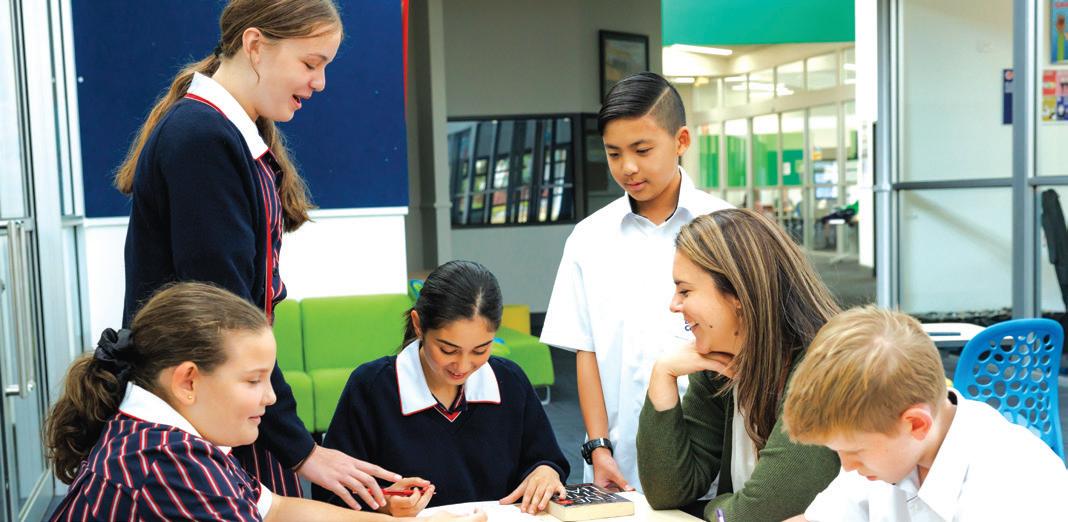
Year 7 students study a core program including subjects in each of the learning areas.
The following subjects are studied for the whole year:
Pastoral Program
Religious Education
English
Mathematics Science
Humanities
Health and Physical Education
The following subjects are studied for one semester only:
The Arts:
• Instrumental Music and Performance
• Paint for me; design for you
Technology:
• Lego Masters
• Binary 101
Languages:
• Italian
• Japanese
The aim of these programs is to work with students who have identified significant need in the development of their literacy and / or numeracy skills and knowledge. This program is not designed to be a boost to the normal curriculum but instead a supplement to support students who find the pace, tasks or concepts in their normal classes challenging.
In these classes students will engage in activities that enable them to practice skills they need to improve their level of competence in English and Mathematics.
At Years 7 and 8 this program replaces the Languages program. This subject is by invitation
Junior Course Guide and important subject information is available on the College website www.ecmelb.catholic.edu.au/learning-teaching/ programs

An integral component of our College’s teaching and learning strategy is to broaden the use of digital technology across the College. Our 1:1 laptop program is designed to enable our students to undertake anywhere, anytime learning with their device.
Why is the program compulsory?
The 1:1 laptop program is designed to meet the learning needs of students. The most effective way for the College to ensure all students are equipped with the tools they need to maximise their learning potential is for all students to have the same make and model device.
How long does the program last?
Our 1:1 program will last for three years. This means your child will have the use of their own laptop from Year 7 through to the end of Year 9. At the end of the three years families now own the laptops outright.
What happens when my child reaches Year 10?
Our 1:1 program continues with a new three year cycle commencing in Year 10. All Year 10 students will be issued with a new laptop for their senior years.
What does the program cost?
The 1:1 laptop program will cost a total of $1,950.00 over the three year period. This means that each year families will pay $650.00 perstudent in Year 7 to participate in the program.
What is included in the price?
The 1:1 program includes the cost of the laptop, laptop bag, software and insurance protection for theft and accidental breakage (an excess of maximum $250.00 will apply). More detailed specifics can be found in the 1:1 Laptop Program User Agreement that families and students are required to sign.
do I have to pay?
The costs of the 1:1 laptop program are incorporated into the College fees.
Who owns the laptop?
To ensure safety and reliability of our network and compliance with software licencing arrangements, laptops will remain the property of Emmanuel College until completion of the 1:1 laptop program. At which point ownership of the device will transfer to you.
What paperwork do I need to complete and by when?
Students and their parents will need to sign the 2025 1:1 Laptop Program User Agreement and return to the College by Friday 8 November 2024. Forms are to be returned to: 1:1 Laptop Program
Emmanuel College PO Box 5 Altona North, VIC 3025
Forms can also be dropped off at the College.

What happens if my child withdraws from Emmanuel College prior to completion of 1:1 program?
Students leaving the College during the course of the 1:1 Laptop Program will be required to return their laptop and pay a pro-rata fee. Families also have the option to purchase the laptop and in doing so will pay all remaining balances on the laptop.
Will my child be expected to buy the College backpack and laptop bag?
Yes. Our College backpacks have been designed to suit the needs of our students and they contain a section to protect the laptop. Furthermore, a laptop bag will be provided with the laptop. Students are expected to store their laptop in the provided bag at all times. The College backpack accommodates the provided laptop bag. The cost of the laptop bag is included in the laptop program costs.
Are you using online resources?
Yes. The College has increased the number of online resources it uses in Year 7, however families will still be required to purchase a mixture of online resources, applications and textbooks which will be outlined on the book list.
What happens if something goes wrong with the laptop?
Emmanuel College operates a Digital Services Helpdesk that supports students and staff with a range of problems they may encounter whilst using the College’s Digital systems. The 1:1 Laptop Program User Agreement contains more information about the support students can expect from the Digital Services helpdesk when things go wrong.
What happens if my child accidently breaks their laptop?
All claims for accidental breakage will follow the procedure as outlined in 1:1 Laptop Program User Agreement. The majority of claims will be subject to an insurance excess of up to $250.00.
Students may be able to borrow a device from the Digital Services helpdesk so they can continue with their learning whilst their laptop is being repaired. In these instances students will be provided with a claims form which requires parental signature. It is important to note that if damage is the result of misuse or a student not adhering with the terms of our ICT Student User Agreement then the College may impose additional fees and charges.
On this point we ask students to be vigilant in how they care for their laptop. As the laptop is a high performance device, replacement parts are quite expensive. So if repairs are required (outside the conditions of the warranty) then be mindful that families may need to pay the $250.00 excess.
What happens if my child’s computer is stolen?
All claims for theft will follow the procedure as outlined in 1:1 Laptop Program User Agreement. It is important that you file a police report as claims cannot proceed without a written report. Claims for theft will be subject to an insurance excess of $250.00. Students may be able to borrow a device from the IT helpdesk so they can continue with their learning whilst their laptop is being replaced.
When will I be able to collect my child’s laptop?
Prior to school starting next year, our IT service will install all the necessary programs and software to ensure that the devices are operational at the beginning of Term 1. All devices will be clearly labelled with the student’s name. All Year 7 students participate in an orientation program during their initial days at Emmanuel College. Students will collect their laptop and learn about their device and our IT network as part of orientation.

Will my child bring their laptop home with them every day?
Yes. It is expected that students will take their laptops home with them so they can continue with their studies as needed. Whilst at home students will be expected to ensure their laptops are charged and ready for the next school day.
Can my child charge their laptop at school?
The device has a long battery life of up to nine hours and when fully charged should meet students’ entire learning needs for the school day. The college does not have enough charging points to cater for students to charge devices during the school day. However, if absolutely necessary students will be permitted to charge their computers at school.
We don’t have good internet access at home, will this be a problem for my child?
Although students will not need internet at home to continue with their studies, access to high speed internet will be helpful as they will be able to access their emails, timetable and other resources from SEQTA.
What types of programs or games can my child download to their computer?
No programs other than those we have allowed in our operating system (eg. solitaire, minesweeper) will be installed on the computers. Laptops are a tool to complement student learning therefore, we will only allow other programs that are directly associated with classroom teaching and learning.
What should my child not do on their computer?
All students at Emmanuel College must sign an ICT Student User Agreement, a document that clearly articulates the College’s policy regarding the use of ICT. Parents are also asked to sign this document to ensure that you have been made aware of the College’s ICT policies.
Operoo is a parent-controlled electronic medical form for schools, clubs and other groups with duty of care. It’s an electronic version of the paper based forms you always have to complete for excursions, camps etc. It provides parents the opportunity to update medical information promptly and accurately while providing the school with instant access to the emergency information provided by you. We use the Operoo app in the best interest of the students whilst also reducing the burden on parents to fill out the same information on multiple forms throughout the year. Users can use a PC, laptop, tablet or smartphone to enter the details including:
• Emergency contact
• Contact details
• Medical checklist including asthma, allergies, seizures, diabetes
• Health and ambulance insurance details
• Medical contacts
• Notes and other care instructions from parents.
As a parent / guardian, you will receive an invitation to join Operoo and enter details for your child / children. By following the instructions, you can create your own free Operoo account and control all data about your child / children. The Operoo system stores the information on your behalf and you will be able to grant access to your data with Emmanuel College. You are also able to share data with any other groups or individual you choose. (e.g. Your child’s grandparents, their child-minder, their sports club, etc).


You don’t need to do anything until you receive the email requesting the information.
1. Respond to email invitation;
a. It is important that you use the invitation link as it links directly to your details and you are only required to choose your own password and confirm that your details are still correct.
b. If you have received an SMS message, instead of an email, this means the College does not have your most current email address in our records. Please use the link in the SMS to respond and update your records. Alternatively, you could email the college or call reception for assistance and confirm your current details.
c. Do not go directly to the website to create a new profile as you will then be required to enter all your data.
2. Check the information that is in the profile and update as required.
3. Respond to any future messages / requests from Operoo.
From the College’s perspective, this information will only be visible by the relevant staff for your child and will be managed in accordance with the Privacy Act. Full details of Operoo’s privacy provisions can be also found at https://www.operoo.com/securitypractices/
FAQ
Is the Operoo system secure?
The Operoo system uses sophisticated security measures to keep data safe. Detailed information about security for the system is available on the Operoo website here: https://www.operoo.com/ security-practices/
You control what information is available and can update the information and remove access at any time.
The details will never be made available to any other party without your permission. Your details will never be used, sold or rented to another organisation for any purpose.
Who can see my child’s information when I share this with the school?
The school administrators and teachers on excursions and camps may have access to your child’s care profile. All access requires usernames and passwords and all data is encrypted in the database. Emmanuel College understands the information provided by you is private and sensitive; staff have the same high level of confidentiality with this information as per paper-based records.
Who else can see my child’s information?
Only groups or people you specifically give access to can view the information about your child.
Do you keep track of who is looking at the profiles?
Yes, the Operoo system audits all users of the system at the school. It automatically tracks every occasion a care profile is viewed and by which user and when.
What happens when my child leaves the school?
When your child leaves the school the profile will be archived and not available on mobile devices anymore. Further, any new changes you make to the profile will not be shared with the school. This does not delete the care profile from your account. You still control the care profile and can continue to use it and share it with other trusted individuals or groups. You can also manually delete access to the school yourself after your child has left the school.
How often do I need to update the information?
Once you’ve completed the care profile for your child it is easy to keep it up to date. You will only need to update data when things change. For example, a new emergency contact, updated mobile phone number, a new medical condition, an updated asthma plan and so on. Emmanuel College may ask you to log in from time to time to confirm that details are still up to date.

The care profile is completed...Why am I getting email reminders?
You will receive email (or text) reminders from time to time asking you to confirm that the details are still correct. The College relies on this information to care for your child so it is important that it is current so you may be asked to verify that it is up to date.
Can I use this for other family members?
Yes, once you have entered details for your child you can optionally create care profiles for other family members. You can share these care profiles with people you trust to care for your loved ones; such as family, friends, babysitters and sports coaches.
Can I share this information with anyone else?
Yes, once you have completed the care profile for your child it can be shared with other trusted individuals or groups. You can share the care profile with people you trust to care for your loved ones; such as family, friends, babysitters and sports coaches. If another group (such as a sporting club) uses Operoo you can share the same profile with that group.
My child’s sport club is using Operoo. Do I need to enter the details twice?
No. The care profile you have created for your child can be shared multiple times. This means you only need to update one care profile and all schools, clubs and individuals you share it with have access to the same details. When you make an update all carers who can access the data have the latest information.
What happens when there is no internet access?
The Operoo system allows the school to print a paper report for each profile. There is also a downloadable app for Operoo on iPhone, iPad, Android phones and Android tablets. These mobile versions store a secure encrypted copy of the care profiles on the device. This means the information can be accessed by teachers on an excursion or camp even without internet access.
How much does it cost?
Operoo is free for all parents. Parents can also download the free app for Operoo for iPhone, iPad, Android phones and Android tablets.
Standard Collection Notice and Privacy Policy
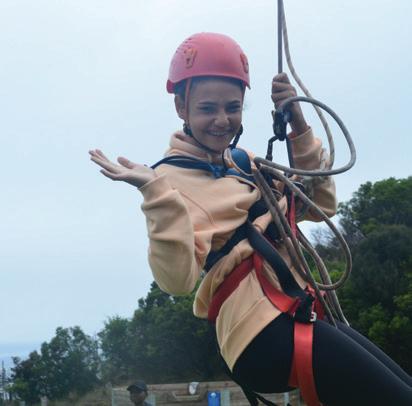
Emmanuel College Standard Collection Notice and Privacy Policies
Please note the College Privacy Policy is available to be viewed on the College website. www.ecmelb.catholic.edu.au

Notre Dame Campus Point Cook (Street Location)

Notes:


